How to Overcome Perfectionism at Work for a Healthier Mindset

Sorry, there were no results found for “”
Sorry, there were no results found for “”
Sorry, there were no results found for “”
Have you ever spent hours polishing a presentation, only to feel like it’s not perfect? Or maybe you feel stressed about taking on new projects because you worry you won’t achieve the (probably impossible) standards you set for yourself. If so, you might be struggling with perfectionism at work.
Perfectionism is like having a tiny, nagging voice inside your mind that tells you, “You’re not good enough.”
86% of people believe perfectionist expectations impact their work and mental health.
Research by the International Journal of Stress Management found that perfectionists are more prone to time anxiety, procrastination, and avoidance behavior.
But the good news? You don’t have to stay trapped in that cycle. Let’s show you how to overcome perfectionism at work with the right tools and mindset!
Perfectionism is more than just wanting to do your best—it’s the unrelenting drive to set high expectations for yourself and avoid mistakes at all costs, which often leads to self-criticism and stress.
While setting high standards can fuel success in life, perfectionism takes it a step too far, leaving you feeling like nothing is ever ‘good enough.’ Setting unrealistic standards can weigh you down, making even simple tasks overwhelming.
Personal perfectionism or self-oriented perfectionism comes from within and is driven by the desire to meet impossibly high standards. If you constantly push yourself to get things ‘just right,’ even at the expense of your well-being, that’s personal perfectionism at play.
Social perfectionism, on the other hand, is external. It stems from the immense pressure to meet other people’s expectations, whether it’s your boss, coworkers, or society in general. You feel judged or compared, and this pressure can lead to burnout and anxiety. Both forms are equally taxing, but recognizing where the pressure comes from can help you start addressing it.
There’s nothing wrong with having high standards—they help you push yourself and achieve great things. But when those standards morph into unrealistic expectations, that’s when perfectionism starts becoming harmful. High standards are motivating and achievable, while unrealistic expectations are impossible to attain, leaving you disappointed or stuck in a cycle of never-ending revisions.
Example:
Striving to deliver high-quality work by a deadline is a healthy standard. But constantly thinking, “This has to be flawless, or it’s a failure,” is an unrealistic expectation that can result in procrastination or stress.
While perfectionism might seem helpful on the surface, it can quickly become a double-edged sword. Instead of driving success, it often leads to frustration, burnout, and stalled progress.
Here are some of the negative effects of perfectionism:
If you’re experiencing any of these adverse effects and want to change the narrative, don’t worry. We’ve got just the tips for you!
Overcoming perfectionism is about taking a balanced approach—focusing on progress instead of perfection and using tools that support that shift. That’s where ClickUp comes into play.
ClickUp, a comprehensive project management platform with robust features for task planning, execution, and monitoring, can be your go-to tool when you’re learning how to overcome perfectionism at work. It helps you work smarter, not harder.
One of the core challenges for perfectionists is setting impossible standards. With ClickUp’s Goals feature, you can break daunting tasks into achievable milestones. Rather than aiming for an unachievable ‘perfect’ outcome, you can set realistic, measurable, and achievable goals that track and fuel your progress over time.
Example:
❌ Perfectionist goal: Build a flawless e-commerce platform with every feature imaginable
✅ ClickUp Goals milestone breakdown:
Phase 1: MVP foundation (2 weeks)
Phase 2: Core shopping features (3 weeks)
Phase 3: User experience (2 weeks)
Phase 4: Testing & Polish (2 weeks)
Phase 5: Launch preparation (2 weeks)
Instead of trying to build everything perfectly at once, this approach starts with a working MVP, adds features incrementally, has clear, testable deliverables, and shows progress through small wins.
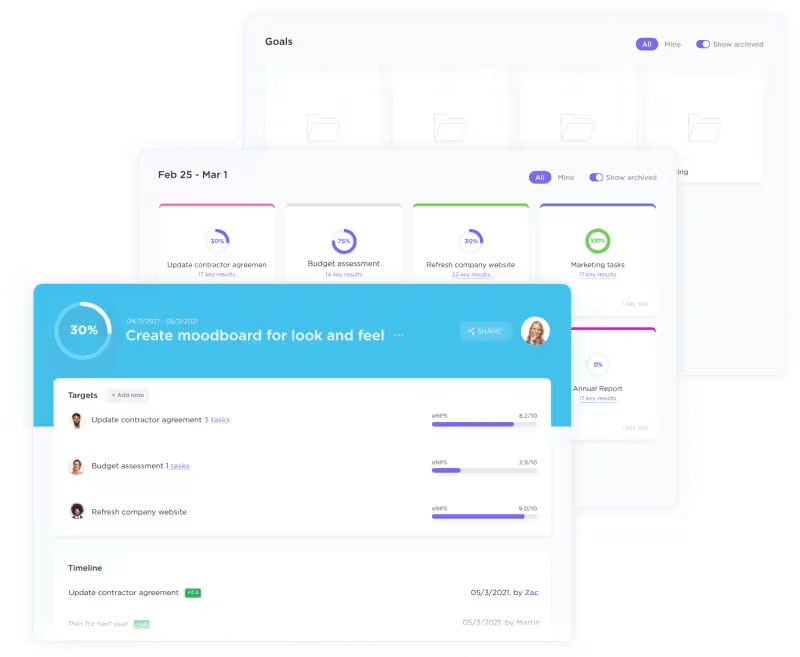
Whether it’s meeting deadlines or hitting key performance metrics, ClickUp allows you to visualize your accomplishments step by step, helping you stay focused on the big picture without obsessing over the minor details.
Mistakes aren’t failures—they’re part of the growth process. ClickUp Tasks help you log lessons learned from your mistakes directly into your task management system with the following:

This helps you track your development and shifts your mindset from fearing failure to embracing it as a natural part of the journey.
Perfectionists tend to move from one task to the next without taking a moment to acknowledge their progress and enjoy life. With ClickUp, you can easily track and celebrate your wins. Each completed task, milestone, or goal gives you a reason to pause and reflect on how far you’ve come.
Seeing tasks marked as ‘complete’ in real time helps fight the perfectionist’s tendency to overlook accomplishments. Plus, ClickUp’s Customizable Views let you highlight completed tasks, supporting the positive impact of your work.
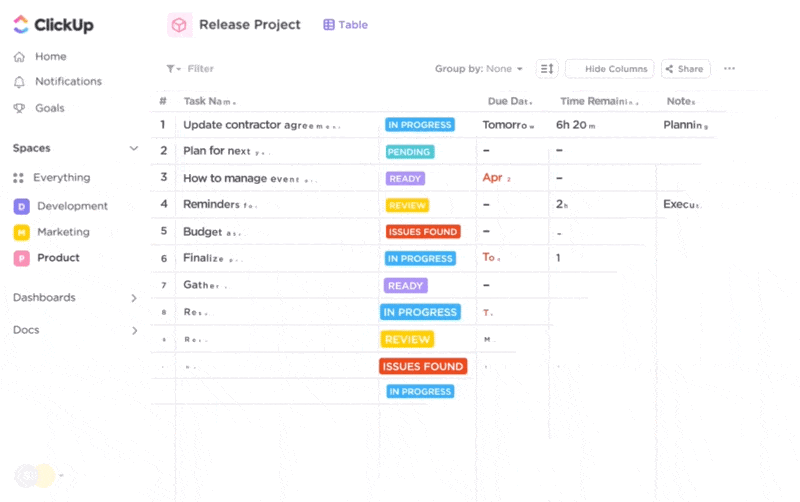
One of the key pitfalls of perfectionism is spending far too much time on tasks in pursuit of an unattainable ‘perfect’ result. This hampers productivity and leads to frustration, burnout, and missed deadlines.
ClickUp’s Time Tracking and Time Estimate features help you set clear boundaries for how much time you spend on each task, ensuring you stay on track without over-polishing or micromanaging details.
ClickUp’s Time Tracking feature tracks the time spent on each task, providing real-time insights into your workflow.
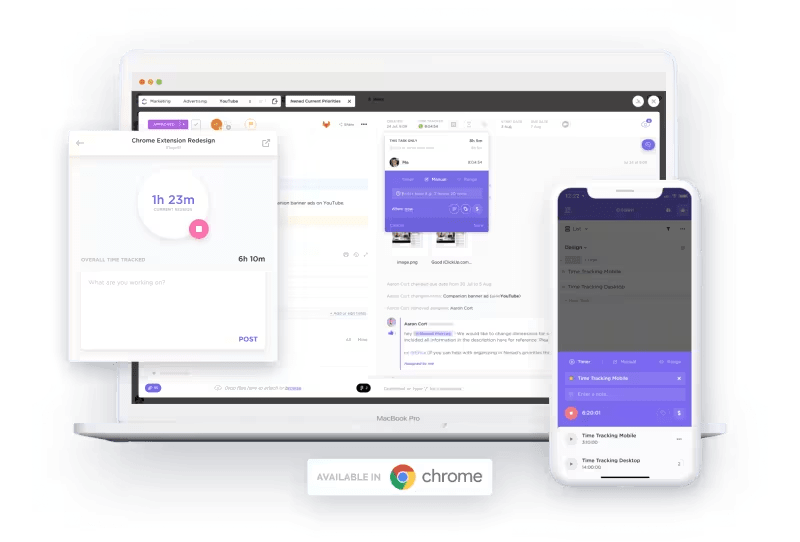
With ClickUp’s Time Tracking feature, you can:
In addition to tracking time, you can also benefit from Time Estimates in ClickUp, a unique feature that helps you predict how long tasks should take. This allows you to set realistic time limits from the start.
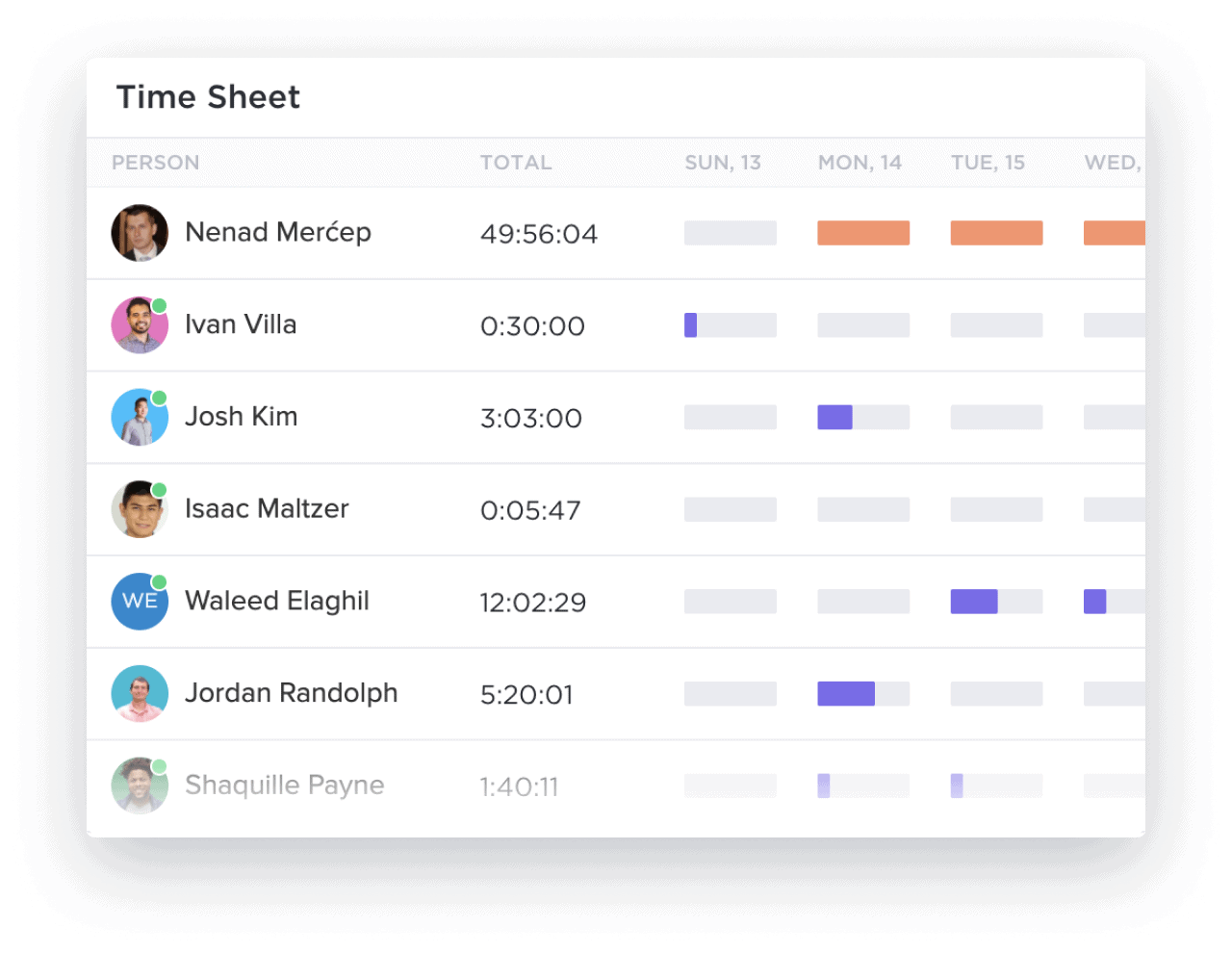
Here’s how Time Estimates are particularly useful for overcoming perfectionism:
That’s not all! ClickUp also provides built-in templates to make this job easier. ClickUp’s Personal Time Management Sheet Template allows you to organize your day-to-day activities, time estimates, and tracked hours in one place.
With this template, you can:
Perfectionists often struggle with sharing their work, waiting until everything is flawless before letting others see it. But in reality, sharing your work early and frequently helps you get constructive feedback, refine it faster, ensure you’re on the right track, and prevent you from getting stuck in the perfectionist cycle.
With ClickUp, seeking feedback is easy and seamlessly integrated into your workflow, making collaboration an essential part of your day-to-day tasks.
ClickUp’s Chat feature is a game-changer when it comes to getting constructive criticism. Instead of relying on scattered emails or separate messaging apps, you can chat directly within ClickUp, keeping all tasks and conversations related to a project in one place.
This instant communication helps perfectionists break the habit of working in isolation. It allows them to get valuable input from others early in the process, ensuring they aren’t stuck in the cycle of endless revisions.
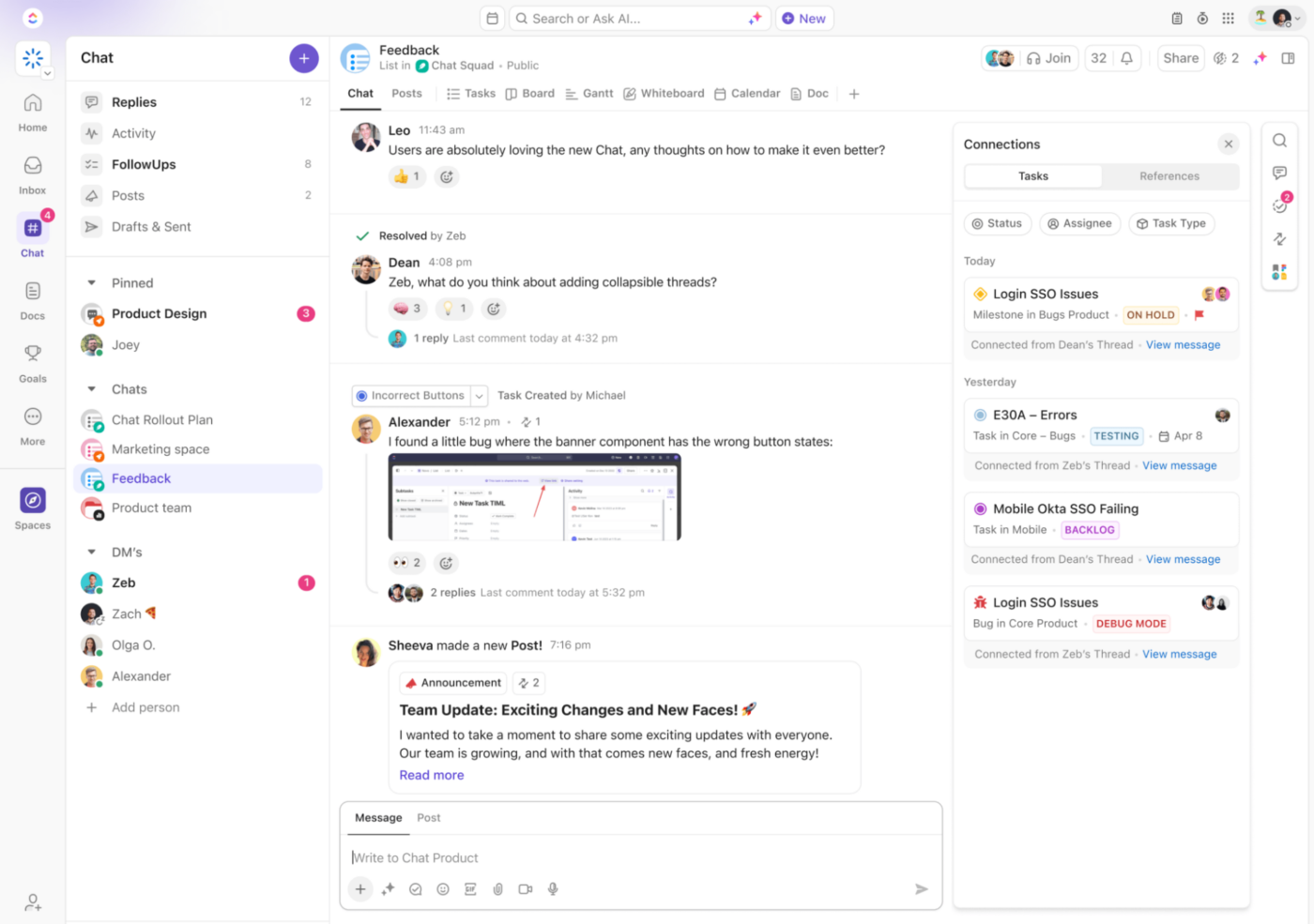
ClickUp’s Comments also make it easier to gather feedback on specific tasks or projects. Instead of waiting for a full meeting or chasing down feedback via email, you can get actionable insights directly within the task you’re working on.
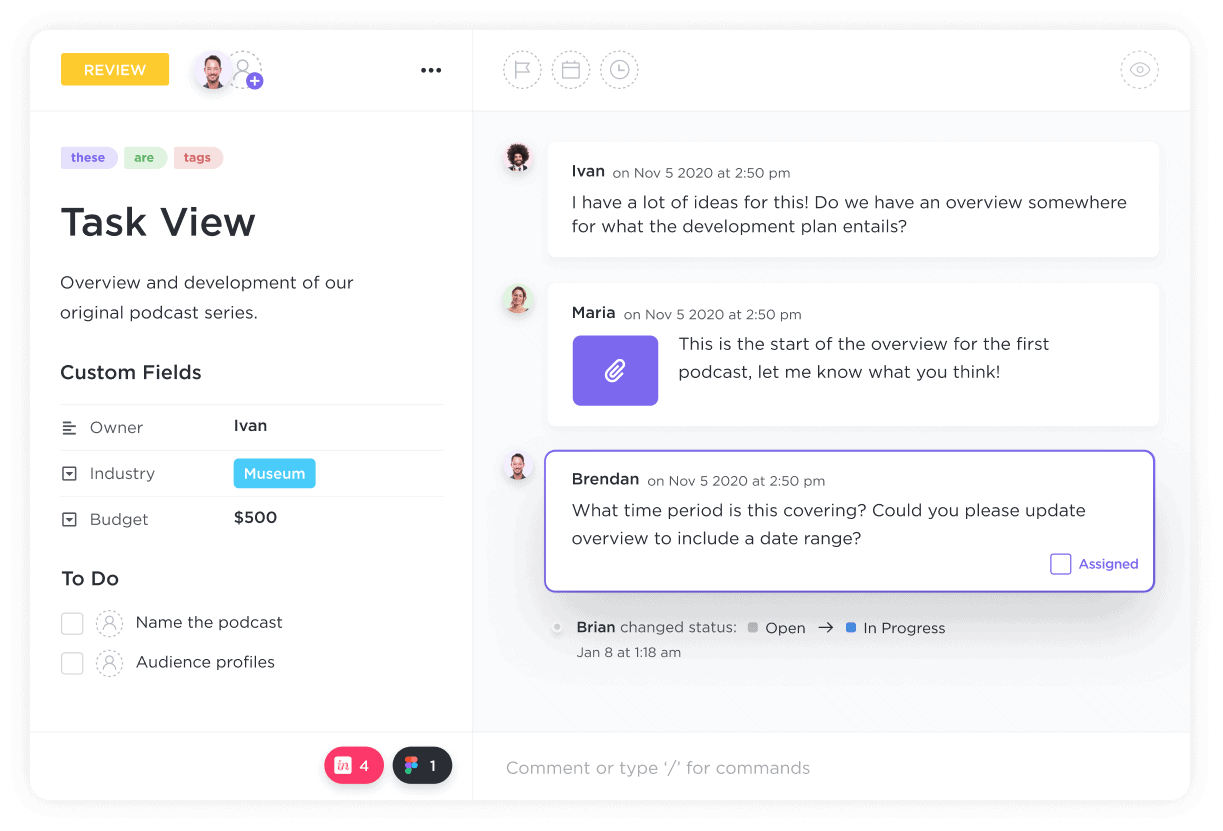
The Mentions feature in ClickUp is perfect for looping in the right people at the right time. You can ‘@mention’ colleagues, stakeholders, or managers in tasks or comments, ensuring that the feedback is directed to the right person for the most relevant input.
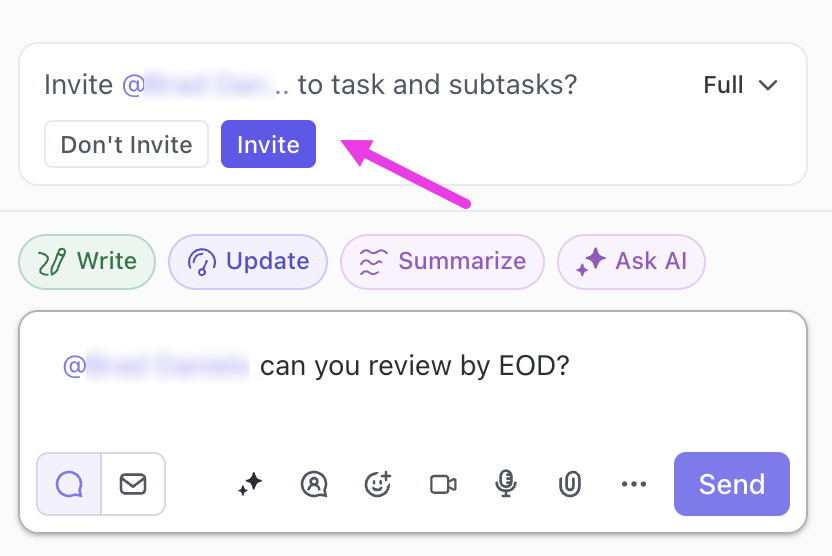
💡Pro Tip: For a more structured way to manage your workload and balance your time, try ClickUp’s Employee Workload Template
One of the most crucial steps to overcoming perfectionism is learning to be kind to yourself. Perfectionists often have an inner critic that’s louder than anyone else’s voice, and this critic tends to magnify every little mistake.
Practicing self-compassion is about shifting that mindset from harsh self-judgment to understanding and patience. Studies have shown that self-compassion isn’t just a feel-good’ approach—it leads to better emotional resilience and lower levels of anxiety and depression.
Instead of fixating on what you didn’t accomplish or what went wrong, practicing self-compassion allows you to acknowledge the effort you’ve put in and accept that mistakes are part of the growth process.
At some point, perfectionists need to embrace the concept of ‘good enough.’ This doesn’t mean lowering your standards or compromising—it means recognizing that striving for absolute perfection is unrealistic and often counterproductive.
The truth is, perfection doesn’t exist. There will always be room for improvement, but that shouldn’t stop you from moving forward. Aiming for ‘good enough’ is often more efficient and healthier.
Focus on completing tasks well rather than perfectly to free yourself from the unrelenting pressure to get everything exactly right. Sometimes, ‘good enough’ really is more than enough.
Read More: These well-being strategies will help you overcome perfectionism and be more productive, minus the stress
Overcoming perfectionistic thoughts is not just a one-time fix; it’s a journey that requires ongoing effort and self-awareness. To maintain a healthier mindset and avoid slipping back into old habits, integrate regular self-reflection and build a robust support network into your routine.
Self-reflection helps you identify patterns in your behavior and mindset, making it easier to spot perfectionist tendencies.
Here are a few self-reflection strategies for high achievers:
A supportive network always has your back for staying accountable and motivated.
Here’s how to build a supportive network:
Read More: How to Deal with Decision Fatigue at Work
Overcoming perfectionism at work is a journey that requires courage, self-compassion, and the right tools.
ClickUp is more than just a project management tool; it’s your ally in the battle against perfectionism. By helping you document your tasks, track progress, manage your time better, and gain control of your day, ClickUp can help you identify your strengths and shortcomings and overcome perfectionism—slowly but surely.
Sign up on ClickUp for free today and take the first step towards a healthier, more productive you!
© 2026 ClickUp